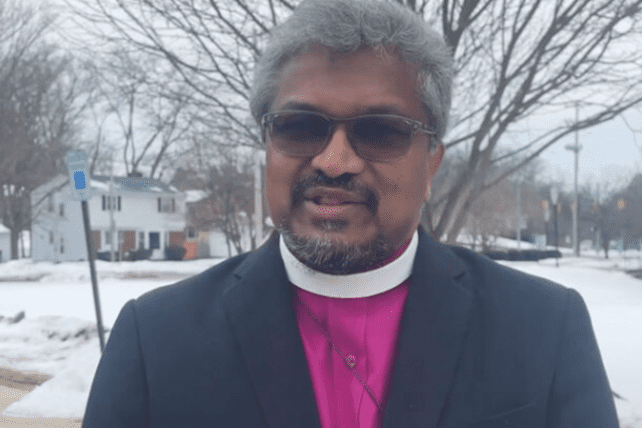Six months later, the brothers say, neither Curry nor Ousley had followed up.
“If you’re a presiding bishop, and someone comes to you with claims of abuse … isn’t it your responsibility to investigate their scope?” asked Eklan Singh.
In late 2022, Suganthy-Singh emailed Curry that she had felt shunned by his lack of a personal response. In an ensuing video call in February 2023, she told Curry how she had left her house because she felt unsafe, alleging that Prince Singh had waved a kitchen knife at her in anger, then denied that he did so. In an email the next day, Curry said Ousley would follow up to facilitate family therapy and discuss next steps, but the family says it never heard from Ousley.
After Prince Singh learned that his sons had shared allegations with the presiding bishop, he texted them that if he were to lose his job, he would no longer be able to pay for their cellphone bills, health care, Eklan’s tuition fees or “any future requests for financial help.”
In March, Nivedhan Singh agreed to join his father for a counseling session with David Singh, who had claimed in an earlier email he’d been appointed by the presiding bishop to provide counseling to Prince Singh. According to Nivedhan, David Singh is a pastor, not a licensed therapist, and a close friend of his father’s. David Singh is not related to Prince Singh or his family.
Nivedhan described the session as an “intervention” during which David Singh and his father insisted he was projecting resentment toward his father due to abandonment issues.
“Yes, my dad was absent for a lot of my life, but when he was there he would beat me up,” said Nivedhan Singh.
In June 2023, Eklan and Nivedhan posted the letters they’d written to Curry on Facebook. Two days later, Bishop Stephen Lane, provisional bishop of Rochester, New York, received an email with Nivedhan Singh’s disclosure and said it constituted a formal complaint against a bishop, which he directed to the Title IV intake officer.
“Bishop Lane did in five minutes what Presiding Bishop Curry didn’t do in six months,” Nivedhan Singh told RNS.
In an email sent to members of the dioceses of Eastern and Western Michigan on June 19, diocesan leaders described Nivedhan and Eklan Singh’s allegations as “internal family dynamics,” wording Nivedhan found dismissive and offensive.
Attached was a letter from Prince Singh in which he noted that “divorce is messy” and said he was “deeply embarrassed” by his sons’ allegations. He said his sons had either declined or discontinued family therapy (referring to the session with David Singh), and he added that he had “encouraged” the presiding bishop’s office to open a Title IV investigation, though Lane had already submitted a complaint. Prince Singh also said that he was not suspended but would submit to a clinical evaluation and then take “a reflective retreat.”
Matthew Townsend, who served as Prince Singh’s communications director in Rochester, questioned why statements from Prince Singh were issued at all.
“I was troubled by what he wrote, and I was equally troubled that the diocese would issue such a statement from him. When someone has been accused of some kind of misconduct, I find it unusual that they would be allowed on an official channel to say anything about the complainants.”
In July, Eklan Singh, Nivedhan Singh and Suganthy-Singh launched www.episcopalaccountability.com, a website documenting their allegations. The site makes clear their belief that Prince Singh violated the Episcopal Church’s clergy standards of conduct at several junctures and their claim that Ousley and Curry violated Title IV protocol by failing to promptly deliver information on an offense to the intake officer.
The family members have continued advocating for the deposition of Prince Singh and Title IV investigations into Curry and Ousley. They are also asking for a third-party investigation into the actions of Curry and Ousley, believing it unlikely that the church will follow its own Title IV procedures.
Prince Singh has continued to maintain that his sons’ allegations are an emotional response to the divorce, but Suganthy-Singh, Nivedhan and Eklan Singh disagree, saying it’s about an institution that elevates individuals, imbues them with spiritual authority and grants them a platform for controlling their public image, regardless of their moral and ethical qualifications and the impact on survivors.
This article originally appeared here.

